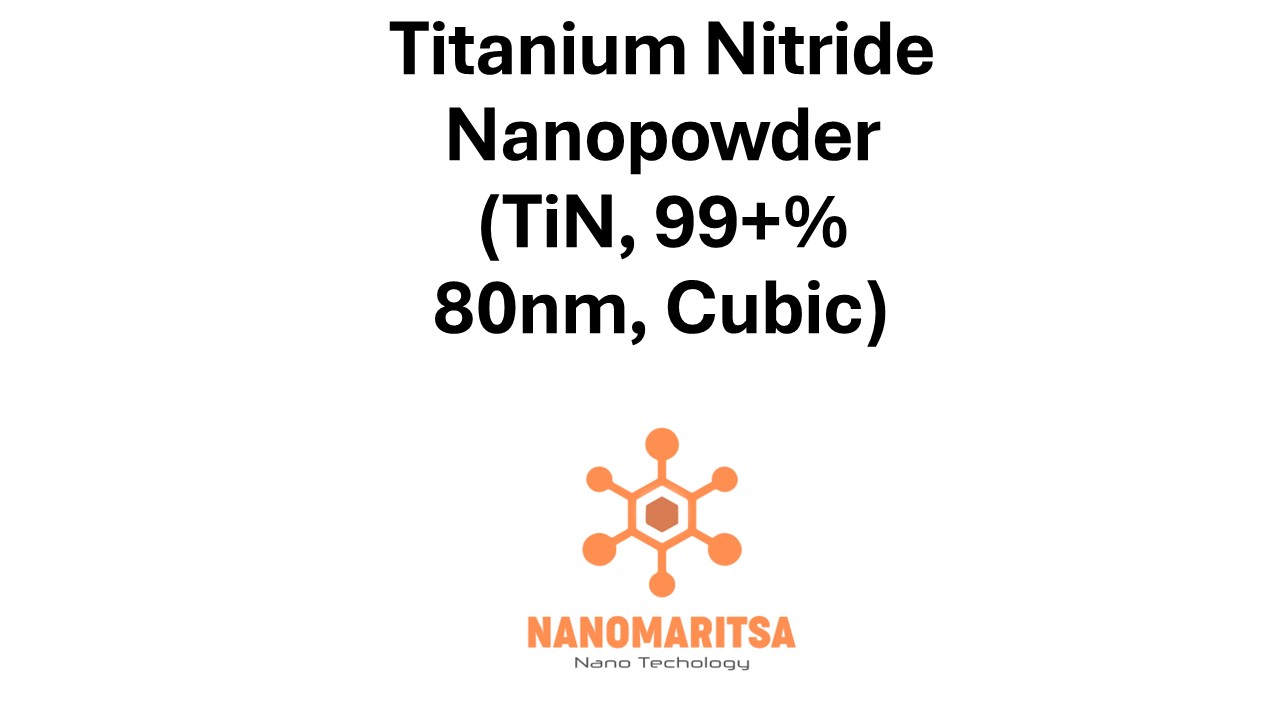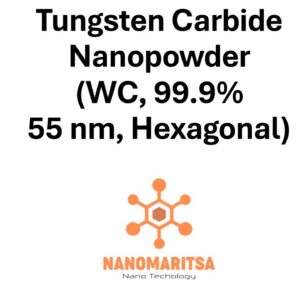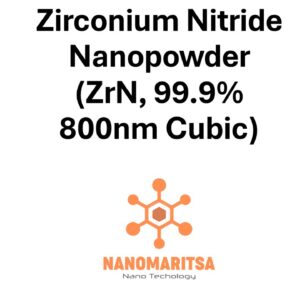Titanium nitride (TiN) nanopowder, with a purity of 99+% and a particle size of 80 nanometers, is a high-performance material celebrated for its exceptional hardness, thermal stability, and electrical conductivity. Its cubic crystal structure makes it ideal for a wide range of advanced applications in industries such as aerospace, electronics, energy, and biomedicine. TiN nanopowder combines superior durability, chemical resistance, and functional versatility, enabling innovation across cutting-edge technologies.
Composition and Structure
TiN (Titanium Nitride):
Titanium nitride is a binary compound of titanium and nitrogen, forming a dense and durable ceramic material. Its cubic crystal structure ensures uniform mechanical strength, excellent wear resistance, and reliable thermal stability, making it ideal for demanding applications in high-stress environments.
Purity (99+%):
With a purity of 99+%, TiN nanopowder minimizes impurities, ensuring consistent performance in critical applications such as electronics, coatings, and biomedical devices. High purity is essential for maintaining material integrity in precision applications.
Particle Size (80 nm):
The fine particle size of 80 nanometers provides a high surface area, improving reactivity, dispersion, and sintering properties. This nanoscale size allows for seamless integration into advanced composites, coatings, and functional systems.
Properties
Exceptional Hardness and Wear Resistance:
TiN nanopowder exhibits superior hardness, making it highly resistant to abrasion and wear. These properties make it ideal for applications such as cutting tools, molds, and industrial machinery.
Thermal Stability:
TiN retains its mechanical properties at elevated temperatures, making it suitable for high-temperature applications in aerospace systems, industrial furnaces, and power generation systems.
Electrical Conductivity:
Unlike many ceramics, titanium nitride demonstrates excellent electrical conductivity, making it an ideal material for conductive coatings, electrodes, and components in microelectronics.
Chemical Resistance:
Highly resistant to oxidation, corrosion, and chemical degradation, TiN nanopowder performs reliably in chemically aggressive environments.
Biocompatibility:
TiN is non-toxic and biocompatible, making it an excellent material for biomedical implants, surgical instruments, and other medical devices.
Applications
Wear-Resistant Coatings:
TiN nanopowder is widely used to produce hard, wear-resistant coatings for cutting tools, industrial machinery, and molds. These coatings extend the lifespan of components subjected to high-friction and high-stress environments.
Electronics and Conductive Components:
The electrical conductivity of TiN makes it suitable for use in electronic components such as resistors, capacitors, and conductive coatings in high-frequency and high-power applications.
Aerospace and High-Temperature Systems:
TiN nanopowder is used in the production of aerospace components, including turbine blades, nozzles, and thermal barrier coatings. Its thermal stability and wear resistance ensure reliable performance under extreme conditions.
Biomedical Applications:
TiN is employed in medical devices, including surgical instruments, implants, and dental tools, due to its biocompatibility, durability, and corrosion resistance.
Decorative Coatings:
With its distinctive golden appearance and durability, TiN is used for decorative finishes on luxury goods, watches, and architectural elements.
Energy Storage and Systems:
TiN nanopowder enhances the performance of batteries, fuel cells, and supercapacitors by improving conductivity, stability, and overall efficiency.
Recent Advancements and Research Contributions
Massachusetts Institute of Technology (MIT), USA:
MIT researchers are investigating TiN nanopowder for high-performance energy storage systems and advanced microelectronics.
University of Manchester, UK:
The University of Manchester is exploring TiN-based coatings for enhanced wear resistance and thermal management in industrial and aerospace applications.
National University of Singapore (NUS):
NUS scientists are advancing TiN’s applications in biomedical technologies, including surgical implants and bioelectronic devices.
Tsinghua University, China:
Tsinghua University is developing TiN nanopowder for hybrid materials and additive manufacturing in energy and electronic applications.
Recent Developments
- 3D Printing Applications: TiN nanopowder is being integrated into additive manufacturing processes for producing complex, high-performance components.
- Hybrid Nanocomposites: Combining TiN with other nanomaterials is unlocking new functionalities in multifunctional coatings and composites.
- Eco-Friendly Production: Advances in sustainable synthesis methods are improving the scalability and environmental impact of TiN nanopowder manufacturing.
Future Prospects
Titanium nitride nanopowder is revolutionizing industries with its unique combination of mechanical, thermal, and electrical properties. As research progresses, TiN nanopowder is expected to:
- Drive innovations in energy storage and microelectronics.
- Enhance the durability and functionality of cutting tools and industrial coatings.
- Enable advancements in biomedical devices and surgical technologies.
Titanium nitride nanopowder (TiN, 99+%, 80 nm, Cubic) is a transformative material for next-generation applications, offering unparalleled performance and versatility. Its exceptional properties and scalability make it an indispensable resource for industries seeking high-performance solutions in demanding environments.
| Measurement (gr) | 100 grams, 500 grams, 1000 grams |
|---|






